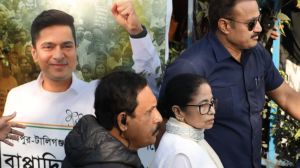Amid a high-octane campaign for Assembly elections in five states, the Budget session of Parliament began Monday with Prime Minister Narendra Modi asking parties to keep aside election concerns and ensure a “fruitful” and “constructive” session with “meaningful and effective discussions”.

Finance Minister Nirmala Sitharaman will present the Union Budget at 11 am Tuesday.
After the Congress, the Trinamool Congress, CPI and CPM gave notice Monday in both Houses for a privilege motion against Minister for Electronics and Information Technology Ashwini Vaishnav for “misleading” Parliament on the Pegasus issue. The Congress gave another notice in Rajya Sabha.
However, Parliamentary Affairs Minister Pralhad Joshi said the matter is sub judice and it is not right for anybody to comment on it. He said it is being probed by a committee appointed by the Supreme Court.
Union Minister Mukhtar Abbas Naqvi too hit out at the Opposition over the Pegasus issue. “The matter is sub judice before the Supreme Court. It’s not right for anyone to comment on it. They are repeatedly raising it. The Opposition parties want to make themselves relevant because their political career is at stake,” he said.
The government made it clear that it would not bring any Bill in the first part of the session which ends on February 11, owing to paucity of time. This also means that any demand by the Opposition for a discussion on any issue will not be accepted by the government.
Story continues below this ad
As many as 15 Bills will come up for consideration and passage in the second half of the session.
These include the Warehousing (Development and Regulation) Amendment Bill, the Competition (Amendment) Bill to carry out certain structural changes in the governing structure of the CCI and changes in substantive provisions to address needs for new age markets, the Emigration Bill, the Pension Fund Regulatory and Development Authority (Amendment) Bill, the National Dental Commission Bill and the Mines and Minerals (Development and Regulation) Amendment Bill.
The proposed amendments in the PFRDA Bill, the government said, are for strengthening PFRDA to “enforce discipline in timely deduction, remittance and investment of contributions; bring clarity in provisions for uniform regulation; for increasing pension coverage through establishment of other trusts for old age income security and auto enrolment; and enabling choice of more pension payout options to subscribers at the time of exit from NPS”.
Defence Minister Rajnath Singh and Leader of the House in Rajya Sabha Piyush Goyal told floor leaders of parties in two separate virtual meetings that only two discussions, one on the Motion of Thanks to the President’s Address and another on the Budget, will be taken up.
Story continues below this ad
Rajya Sabha Chairman M Venkaiah Naidu told the meeting of House floor leaders that during the first leg of the session, only 23 hours will be available for business other than Zero Hour, Question Hour and Private Members’ Business. He reminded the leaders that discussions on the Motion of Thanks to the President’s Address and Budget had taken a little over 26 hours in the last Budget session.
Mallikarjun Kharge, Leader of the Opposition in Rajya Sabha, told The Indian Express: “We have put forward our views. We want discussions on Pegasus, Chinese aggression, Covid management, price rise, unemployment, hate speech including the targeting of Muslim women, attacks on churches, disinvestment.”
He said the government told the parties that there is a constraint of time and all issues can be discussed in the debate during the Motion of Thanks and the discussion on the Budget.
“I told them that the discussion on the President’s Address and Budget are general in nature… We want discussions on specific issues in some form… either through calling attention or short duration,” Kharge said.
Story continues below this ad
Meanwhile, four more privilege notices were given Monday by Opposition members — Saugata Roy (TMC) in Lok Sabha, and Binoy Viswam (CPI), K C Venugopal (Congress) and V Sivadasan (CPM) in Rajya Sabha. Congress leader in Lok Sabha, Adhir Ranjan Chowdhury, had given the first notice Sunday.
Ahead of the start of the session, Prime Minister Modi said: “Elections have their own place and the session its own. The Budget session is an important session and we should make it as effective as it can be.”
He said the current international situation opens up several opportunities for India and its economic progress. The vaccination programme and India-made vaccines, he said, have built trust across the globe. He said MPs could draw international attention on issues that can take the country forward on the path of progress and economic development.
“I appeal to all members and parties to discuss issues with a commitment to take the country forward on the path of economic progress. We must, with all our intellectual resources, ensure that the session is fruitful and the year sees us scale new heights as far as the economy is concerned,” he said.
Story continues below this ad
After the all-party meeting, Lok Sabha Speaker Om Birla said: “I have told the leaders of parties that there could be extensive discussions on the President’s Address and the Union Budget during which all kinds of issues could be taken up, discussing all the issues faced by the country and how the country can go forward in terms of economic and social progress. The members can use the forum to bring the people’s issues to the government’s attention.”
He hoped that the House would function smoothly with the support of all parties and the government.
At the meeting, the parties agreed to have a discussion on the Motion of Thanks to the President’s Address and the General Budget for 12 hours each. The Speaker, sources said, agreed to the Opposition’s demand to have short duration discussions.
The first leg of the Budget session will continue until February 11. From Wednesday, Rajya Sabha will sit from 10 am to 3 pm while Lok Sabha will meet from 4 pm to 9 pm due to Covid restrictions.
Story continues below this ad
There will be a recess from February 12 to March 13 during which the standing committees will examine the budgetary allocations for various ministries and departments. The second part of the session is expected to start March 14 and end April 8.










